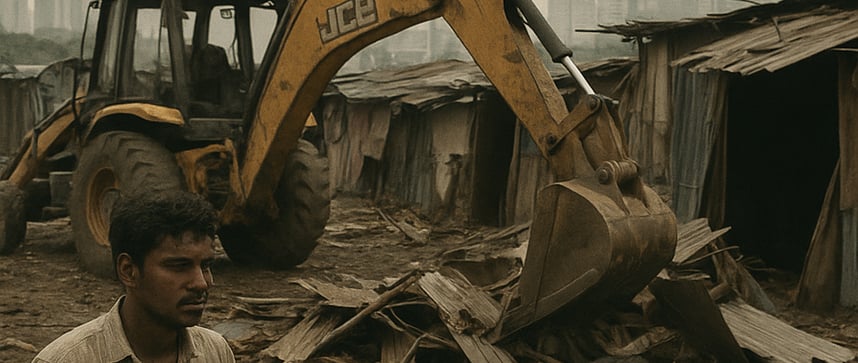SC Demotes Deputy Collector Over Slum Demolitions: A Strong Message Against Disobeying Court Orders


SC Demotes Deputy Collector Over Slum Demolitions: A Strong Message Against Disobeying Court Orders
In a significant development on May 10, 2025, the Supreme Court of India demoted a Deputy Collector from Andhra Pradesh after the officer violated a High Court order protecting the rights of slum dwellers in Guntur. The officer, who had been involved in the demolition of slums despite the court's protective orders, was demoted to the position of Tahsildar and imposed with a fine of ₹1 lakh.
This ruling underscores the importance of adhering to judicial directives and upholding the constitutional principles of justice, especially concerning the right to shelter under Article 21 of the Indian Constitution. The case, which revolves around the demolition of slum settlements in Guntur, highlights the persistent challenges faced by marginalized communities in accessing basic rights such as housing.
The Contemptuous Act and the Court’s Verdict
The Deputy Collector's actions were found to be in direct contempt of the Andhra Pradesh High Court's order, which had specifically barred any demolitions in the slum area, offering temporary relief to the residents. Despite this order, the officer proceeded with the demolition, disregarding the legal mandate and undermining the judicial system's authority.
The Supreme Court’s ruling serves as a reminder that no one, regardless of their position, is above the law. By demoting the officer and imposing a financial penalty, the Court sent a clear message that contempt of court orders will not be tolerated. The Court emphasized that the rule of law must be upheld, and any actions that undermine the authority of judicial pronouncements must be dealt with decisively.
Protection of the Right to Shelter
The incident highlights a critical issue related to the right to shelter, which is protected under Article 21 of the Indian Constitution, which guarantees the right to life and personal liberty. The demolition of slums, without adequate alternative housing arrangements, violates the constitutional protection afforded to these marginalized communities.
Slum dwellers, who often live in informal settlements, face numerous challenges in asserting their rights to shelter. Demolitions, often carried out by local authorities without proper compensation or resettlement plans, lead to the displacement of thousands of families, exacerbating their vulnerability. The Supreme Court’s ruling in this case reiterates the importance of ensuring that such demolitions do not occur without due process and adequate consideration of the rights of affected individuals.
The Impact of the Decision
This judgment sends a strong signal to both government officials and local authorities that they must respect the judicial process and adhere to court orders. By holding the Deputy Collector accountable, the Court has ensured that future actions involving slum demolitions will be carried out in compliance with judicial instructions, with a focus on protecting the rights of vulnerable populations.
The ruling also reinforces the idea that public officials must act in accordance with the Constitution and the laws of the land. The demotion and fine imposed on the officer not only serve as a punishment but also as a deterrent to others in positions of power who might consider violating court orders.
Conclusion
The Supreme Court's decision to demote the Deputy Collector and impose a fine serves as a reminder of the importance of upholding the rule of law and protecting the rights of vulnerable communities. It reinforces the fundamental right to shelter and sets a precedent for future cases involving contempt of court orders related to slum demolitions. The ruling highlights the necessity of respecting judicial pronouncements and ensuring that the rights of marginalized groups are not disregarded in the pursuit of development and urbanization.
